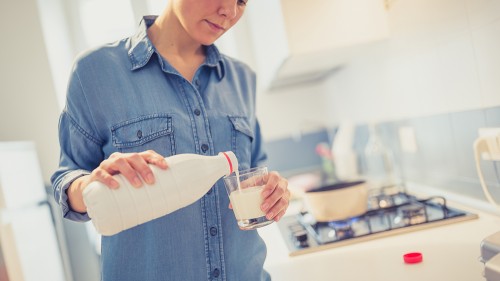What Are Digestive Enzymes and Who Needs Them?
Published on July 13, 2022
Medically Reviewed by Natalie Olsen, MS, RDN
If you struggle with unwanted digestive symptoms, you may be wondering whether you need to take digestive enzymes. Understanding what digestive enzymes are, who needs them, and where they are found can help you make your decision.


When you eat food, your body does the work to digest it so that you can receive the energy and nutrients it provides. Usually, this process is pretty straightforward.
But what happens when things go wrong? Do you need assistance with things like digestive enzymes?
What Are Digestive Enzymes?
Digestive enzymes are what helps break down the food you eat.
In order for food to provide your body with energy and nutrients, it must first be broken down and digested.
As soon as food enters your mouth, enzymes in your saliva start the process of digestion.
As that food moves down your digestive tract, the process of digestion continues.
Digestive enzymes are produced and released by several organs, including your mouth, stomach, small intestine, and pancreas. (1)
There are many different types of digestive enzymes, but they all fall into three main categories.
These categories are in line with the three major macronutrients (carbohydrates, fat, and protein) that make up all food.
Examples of digestive enzymes include: (2)
- Amylases: Helps digest carbohydrates into simple sugars.
- Proteases: Helps digest protein into individual amino acids.
- Lipases: Helps digest fats (also known as triglycerides), into fatty acid
Summary
Digestive enzymes help you digest food. There are many different types of digestive enzymes that assist with digesting carbohydrates, protein, and fats.
Digestive Enzyme Benefits
Digestive enzymes can help manage undesirable symptoms from improperly digested food.
Without them, food would not be properly digested. Improperly digested food can lead to a variety of symptoms, such as: (3)
- Gas
- Bloating
- Abdominal pain
- Heartburn
- Nausea
- Vomiting
- Fatigue
- Bowel problems
- Unexplained weight changes
Digestive enzymes may help prevent or manage any of these symptoms.
They can also protect from malnutrition that is due to improperly absorbed nutrients. (2)
Do You Need Digestive Enzyme Supplements?
Some people’s bodies do not make enough digestive enzymes. Sometimes this is caused by something you are born with, while other times, it can develop over time.
Things that can contribute to not making enough digestive enzymes may include:
- Problems with the pancreas. (4)
- Taking long-term antacids, having hypothyroidism, or having stomach cancer. (5)
- Surgical procedures, like gastric bypass.
- Genetic disorders. (6)
People who have a digestive enzyme deficiency need to take digestive enzyme supplements.
People who have symptoms of improper digestion but do not have a deficiency may or may not benefit from digestive enzymes.
Some research supports the use of digestive enzymes for conditions including irritable bowel syndrome (IBS) and functional dyspepsia. (7)
Summary
Some conditions can cause a digestive enzyme deficiency. This would warrant the use of digestive enzyme supplements. Other conditions, such as IBS and functional dyspepsia, may also benefit from digestive enzyme supplements.
Are Digestive Enzyme Supplements Safe?
There is a low risk associated with enzyme supplements. (8)
However, since over-the-counter digestive enzymes are sold as dietary supplements, they are not well regulated by the FDA. (9)
This means they may include contaminants and not contain exactly what they say they do.
Other possible side effects of taking digestive enzymes if you do not need them include:
- Stomach pain
- Allergic reaction
- Interactions with other substances, medications, or drugs you may be taking
What Are Examples of Natural Digestive Enzymes?
Many foods naturally contain digestive enzymes. Here is a list of some of them:
- Papaya: Contains papain, an enzyme that helps break down proteins. (10)
- Pineapple: Contains bromelain, an enzyme that also helps digest proteins. (11)
- Kiwi: Contains actinidin, a protein-digesting enzyme. (12)
- Honey: Contains a form of amylase, which digests carbohydrates. (13)
- Oats: Contain many lipases to help digest fats. (14)
- Ginger: Contains zingibain, a type of protease that helps digest proteins. (15)
- Mango: Contains amylase for carb digestion. (16)
When to See a Doctor
It is safe to try enzymes to see if they help with digestive symptoms.
However, if symptoms persist, it is best to communicate with your doctor for additional testing or recommendations.
Some symptoms of improper digestion could be signs of a more serious underlying disorder.
Your doctor may be able to run some tests to see if you have a deficiency of digestive enzymes.
They may also be able to recommend or prescribe digestive enzyme supplements.
The Bottom Line
Digestive enzymes help break down the food you eat to help you absorb nutrients and receive energy.
Digestive enzymes help with the digestion of carbs, protein, and fats.
There are many different foods that naturally contain digestive enzymes, but they can also be taken as a supplement.
Not having enough digestive enzymes can cause negative symptoms.
People who are deficient need to take supplements, but those who are not may or may not benefit from them.
Digestive enzymes are safe to take, but check with your doctor if you have persistent negative symptoms as something else may be going on that needs to be addressed.
At WellnessVerge, we only use reputable sources, including peer-reviewed medical journals and well-respected academic institutions.
- Physiology, Digestion - StatPearls - NCBI Bookshelf:
https://www.ncbi.nlm.nih.gov/books/NBK544242/ - Digestive Enzymes and Digestive Enzyme Supplements | Johns Hopkins Medicine:
https://www.hopkinsmedicine.org/health/wellness-and-prevention/digestive-enzymes-and-digestive-enzyme-supplements - Digestive diseases: MedlinePlus Medical Encyclopedia:
https://medlineplus.gov/ency/article/007447.htm - Exocrine pancreatic insufficiency: prevalence, diagnosis, and management - PMC:
https://www.ncbi.nlm.nih.gov/pmc/articles/PMC6432881/ - Achlorhydria - StatPearls - NCBI Bookshelf:
https://www.ncbi.nlm.nih.gov/books/NBK507793/ - Human Metabolic Enzymes Deficiency: A Genetic Mutation Based Approach - PMC:
https://www.ncbi.nlm.nih.gov/pmc/articles/PMC4804091/ - Enzyme therapy for functional bowel disease-like post-prandial distress - PMC:
https://www.ncbi.nlm.nih.gov/pmc/articles/PMC6910206/ - Over-the-Counter Enzyme Supplements: What a Clinician Needs to Know – Mayo Clinic Proceedings:
https://www.mayoclinicproceedings.org/article/S0025-6196(14)00520-5/fulltext#:~:text=a%20new%20tab-,Table%C2%A02Use%2C%20Dosage%2C%20and%20Potential%20Adverse%20Effects%20of%20Common%20Over-the-Counter%20Enzymes,-Name - Information for Consumers on Using Dietary Supplements | FDA:
https://www.fda.gov/food/dietary-supplements/information-consumers-using-dietary-supplements - Comparative Analysis of Papain from Different varieties of Papaya Plant Latex – ResearchGate:
https://www.researchgate.net/publication/279277641_Comparative_Analysis_of_Papain_from_Different_varieties_of_Papaya_Plant_Latex - Bromelain – NIH:
https://www.nccih.nih.gov/health/bromelain - Influence of kiwifruit on protein digestion - PubMed:
https://pubmed.ncbi.nlm.nih.gov/23394986/ - Characterization of Honey Amylase – IFT:
https://ift.onlinelibrary.wiley.com/doi/10.1111/j.1750-3841.2006.00215.x - Nutritional advantages of oats and opportunities for its processing as value added foods - a review - PMC:
https://www.ncbi.nlm.nih.gov/pmc/articles/PMC4325078/ - Data in support of three phase partitioning of zingibain, a milk-clotting enzyme from Zingiber officinale Roscoe rhizomes - PMC:
https://www.ncbi.nlm.nih.gov/pmc/articles/PMC4735474/ - Characterization of novel amylase enzyme from mango (Mangifera indica cv. Chokanan) peel – ResearchGate:
https://www.researchgate.net/publication/262818073_Characterization_of_novel_amylase_enzyme_from_mango_Mangifera_indica_cv_Chokanan_peel






